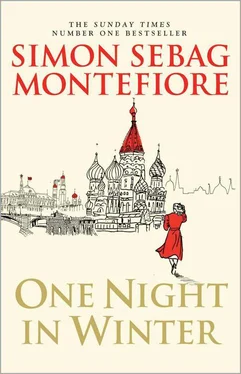I look to you as a beloved father to teach me. Without this paternal instruction, I am, like all of your assistants, lost and in need of guidance.
Hercules Satinov
It was long after midnight in Samarkand, and the cockroaches in Satinov’s red-walled house were manoeuvring as confidently across the floor as tanks in a Red Square parade.
Satinov put down his pen and called the guards. The letter would be despatched at once to wherever Stalin was.
He just hoped it wasn’t too late.
AS THE TRAIN raced through the rolling emerald meadows and ravaged battlefields of Belorussia, Serafima sat in her luxury compartment watching birches rising slim on silvery parade, ruined villages, blackened tanks and row upon row of skeletal trucks. Sometimes, starving wild-eyed women, more like scarecrows than people, ran alongside the train, their yellow fingers outstretched for a crumb of food.
Serafima lay back in her seat, imagining Frank waiting for her on the platform at the Gare de l’Est in Paris, executing that rakish two-fingered salute that always melted her heart. Would he bring flowers? What do two people about to embark on a new life say to each other? None of it mattered because they loved each other.
She could not imagine what New York would be like. She knew that, after some months at the Foreign Ministers’ Conference in Paris, Frank would be taking her back to his townhouse in Manhattan. She closed her eyes and tried to replay images from American movies in her mind, but then she stopped. All that mattered was to see her darling Frank, to kiss him, to hold him, to be his wife. She thought back to the moment they had met at the Bolshoi, the first time they made love, the way he traced the snakeskin on her side and made her feel it was the most beautiful talisman of love the world had ever known. She remembered the shots on the bridge that she had thought marked the end of her romance; her arrest by Abakumov; the prison cell in Lubianka; her mother’s insistence that she delay her departure so she could win that part and her own unease as she agreed; the terrible moment her visa was refused; the miracle of how Stalin had looked at Frank and made it all possible.
‘Just fifteen minutes to Minsk,’ said her steward. ‘Would you like chai ? Lemonade? Juice? Wine? Champagnski ?’
‘Yes. Tea, please.’
The train was already braking for Minsk as he brought in the tea in a china teapot and served it with a napkin on his arm. He gave her the teacup on a saucer as if, Serafima thought, they were in an English duke’s drawing room.
She glanced out of the window. She saw the wrecked suburbs of Minsk as she drank the tea and noticed a house missing every one of its walls but still containing all the beds and tables, toys and books of its vanished family. Where is that family now? It was her last thought before the world started to whirl in giddily quickening circles, stealing the strength from her muscles. Dimly, she heard her teacup smashing into smithereens as her head dropped forward, and oblivion descended softly over her like a black velvet hood.
Satinov was sleeping when the telephone started to ring. It was a few hours after midnight, but he picked it up anyway.
‘Comrade Satinov?’
‘Yes?’
‘I have Comrade Stalin for you.’
Vibrations on the line twanged and looped along the wires that crossed steppes and deserts.
‘ Bicho! Boy! Are you busy there?’ It was him .
‘Comrade Stalin, Bolshevik greetings.’
‘If I’m not interrupting your work on the sugar harvest, do you have time to talk?’
‘Yes, Comrade Stalin.’
‘Hercules, you’ve been re-elected as a Party Secretary and First Deputy Premier.’
A breath of relief. ‘Thank you, Comrade Stalin.’
‘The Party is always just, Hercules. Comrade Stalin is always fair. Come visit an old man who knows how to grow the best tomatoes in Georgia and we can sing “Suliko” on the verandah at night. Do you remember?’
‘Yes, yes, of course.’
‘No hard feelings eh?’
‘None.’
‘Too many informers in this country. Too many yesmen! But everything has to be checked out.’
‘Vigilance is our first duty.’
Satinov realized that, although Losha had been tortured, he had not betrayed him. But he had known about the affair with Dashka, which was why he had mentioned Prussia and Berlin: to let Satinov know that he knew and would die rather than tell. Satinov swallowed the sudden lump in his throat. He had never had a better friend than Losha. But he knew Losha would never come out alive.
‘So to business,’ said Stalin. ‘Molotov has displayed arrogant insubordination. Go to Moscow. Deliver a harsh reprimand. And one other thing. You curate Health?’
‘If you wish it, Comrade Stalin.’
‘We need a new minister. That woman doctor didn’t work out – they’re checking her out. And that husband of hers, what a bungler. There’s a plane on its way.’
The phone went dead and Satinov remained half sitting, half crouching on the edge of the bed, staring into the darkness, absorbing this news. ‘That woman doctor… checking her out.’ The spell cast by Stalin’s favour was disturbed by his confused anxiety for Dashka. What had he done?
Skidding tyres and slamming doors; the driveway was illuminated and men in uniforms were turning on the lights in the house. Colonel Osipov, who had informed him of his downfall a few weeks earlier, came into the bedroom.
‘Come on, Comrade Satinov,’ he said, shaking him as one might wake a child. ‘Morning comes early for the fortunate.’
The first day of the winter term at School 801.
Many children had left and Director Kapitolina Medvedeva was proud that most had passed into Moscow University and a few had won places at the élite Institute of Foreign Languages. As she stood at the Golden Gates that September morning, waiting for the parents and children to arrive, she noticed out of the corner of her eye that Innokenty Rimm had, as she had suggested, stationed himself behind her to hurry the children into the school and avoid a long queue.
‘Everything’s ready, just as you asked, comrade director,’ said Rimm.
‘Very good, Comrade Rimm.’ Now she could finally allow herself a little satisfaction that she was back in the job that she loved, while knowing that only one thing had saved her from the unspeakable fate that had befallen her colleague Golden.
After hearing the grave accusations against her at the tribunal at the Education Sector of the Central Committee, she had said: ‘Inspectors, comrades. May I speak? This concerns a message from the highest authorities that I think you will find relevant to my case.’
And she had handed them the scrap of paper with its red-crayonned scrawl: To Teacher Medvedeva. Svetlana certainly knows her history. The Party values good teachers. J. St.
Yes, Svetlana Stalina had loved history, and one snowy morning in 1938, the little girl with the freckles and the red hair had arrived at class with a note which she had delivered to her favourite teacher.
Kapitolina had told no one about the note, and shown it to no one. Yet this sacred piece of paper had saved her.
The limousines were driving up. And there was Comrade Satinov arriving with his daughter Mariko. He looked darker and leaner than before, and the lines on his face more pronounced.
‘Good morning, Comrade Satinov,’ said Kapitolina Medvedeva. ‘Welcome back for another term at School 801.’
She saw it all. In desolation,
The simple girl he’d known before,
Who’d dreamt and loved, was born once more.
Читать дальше












